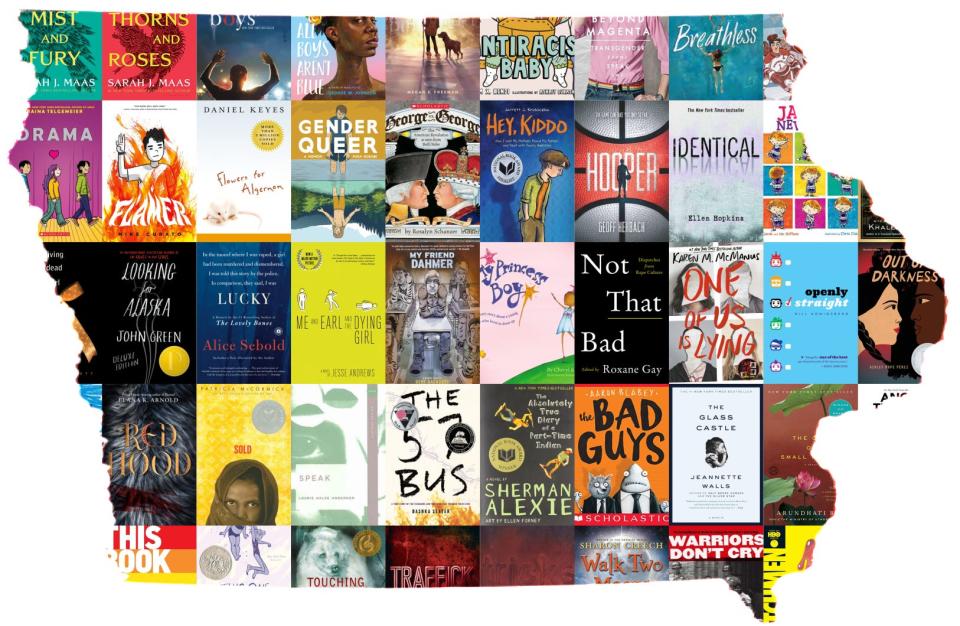After federal judge's injunction on Iowa's book ban law, confusion and concerns linger
Part of an occasional series.
Until a month ago, Des Moines Public Schools special education teacher Dan Gutmann worried that several books available in his classroom would be the reason he walked away from being a teacher.
The books, which are meant for younger readers and include “Best At It” by Maulik Pancholy and “Pride: The Story of Harvey Milk and the Rainbow Flag” by Rob Sanders, already had been removed in nearby school districts under the belief they violated a far-reaching new state education law. His collection also includes books with different family structures, stories featuring members of the LGBTQ community, and Latino, Asian, African and Black characters. He says the books do not feature sex, which the law prohibits.
The sweeping new education law, Senate File 496, which took effect last summer, restricts instruction and curriculum about gender identity and sexual orientation through sixth grade and bans books that depict sex acts.

He feared he could be forced to remove books — or risk professional sanctions — and, along with several other plaintiffs, he sued the state over the law.
Gutmann and other teachers in Iowa still are unsure how the law applies to them or their classroom libraries. Though a federal judge blocked the state from enforcing major portions of the law, the order did not require districts to take any specific actions or give any further guidance on how to comply.
Districts continue to apply the law inconsistently across the state, including decisions on what kinds of books to remove, how or when to disclose those lists to the public, and whether to put back books that were taken off the shelves in preparation for the law's penalties to take effect Jan. 1.
More: Which banned books have been removed from Iowa schools? Our updated database lists them
Des Moines Public Schools is waiting for the Iowa Department of Education to issue guidance before removing books. Some public school districts told the Des Moines Register last fall they were waiting for state guidance before removing books, but others have taken dozens of books, including classic novels and LGBTQ children's books, off the shelves.
The state, meanwhile, has since appealed the judge's decision.
Gutmann — who grew up at a time when diverse families were not as commonly showcased in literature — knows firsthand how important representation is for students.
“My son, who has a gay father, didn't see literature when he was a small child representative of our family,” he said. “And that makes it difficult to navigate as a part of the LGBTQ community when we don't get to experience or learn about other people's experiences.”
Federal court puts on hold key parts of Senate File 496
Senate File 496 faces two lawsuits — one from Iowa families and an LGBTQ advocacy group and one from publisher Penguin Random House and authors whose books were banned — accusing officials and the law of violating the U.S. Constitution and discriminating against LGBTQ viewpoints. Gutmann and two other educators are plaintiffs in the latter lawsuit.
In late December, U.S. District Court Judge Stephen Locher blocked enforcement of two key pieces of Senate File 496 while the legal challenges continue: the law’s prohibition on instruction about sexual orientation and gender identity through sixth grade and its ban on most books depicting or describing sex acts from all schools.
Locher’s ruling also blocked a part of the law that would have penalized teachers and school district officials who did not remove books from schools that were deemed to violate the law. Those penalties were to go in effect Jan. 1.
The judge wrote that the book ban imposed a “puritanical pall of orthodoxy” over school libraries and made no attempt to target books in a reasonable way while requiring the removal of any book that depicts or describes a "sex act," regardless of context. He emphasized the hundreds of books that had been removed from schools, "despite undeniable political, artistic, literary and/or scientific value.”
Locher also found that the gender and sexuality curriculum restrictions, which some districts have interpreted to include removing books, were “staggeringly broad” and that a teacher could not ask to be called “Mr.” or “Miss” under the law’s plain, neutral text.
Related: 'I did not write it to titillate a reader': Authors of books banned in Iowa speak out
The lawsuits are ongoing in court, and Iowa Attorney General Brenna Bird has appealed the judge’s injunction to the Eighth Circuit. Initial filings in the appeal are due in March, according to court records.
"Iowa’s law is clear; sexually explicit books and materials have no place in our elementary school classrooms or libraries,” Bird said in a statement earlier this month. “As a mom, I share parents’ concerns and remain committed to keeping our schools a safe place for kids to learn and grow. With this appeal, we will continue the fight to protect Iowa families and to uphold Iowa’s law in court.”
School districts do not have to return books to shelves
The judge's decision came while educators and students across the state were off for winter break.
While the ruling blocked enforcement of the law's book ban and curriculum restrictions, it did not require school districts to put removed books back on the shelves or make any changes to curriculum.
How school districts have handled the injunction varies.
The Register requested information from Des Moines metro school districts earlier this month about their response to the injunction. Many indicated they were still reviewing it and had not made any decisions.
“A thoughtful, diligent process was utilized to ensure compliance with Senate File 496 at the beginning of this school year,” Ankeny schools spokesperson Samantha Aukes said in a statement. “Likewise, the district will pursue a thoughtful, diligent process in reviewing this injunction and any further changes to ensure Ankeny Schools continues providing high-quality education for its students. While the district will ensure compliance with state and federal laws, changes that occur mid-school year put an added burden on education professionals.”
Spokespeople with the Waukee and North Polk districts told the Register they did not plan to make any changes to removed materials following the injunction.
"The materials that were removed from shelves are currently in storage," Waukee schools spokesperson Kayla Choate said. "We're following the advice of our (legal) counsel to stay in our current state until additional decisions emerge."
Meanwhile, the Iowa City and Cedar Rapids districts have reshelved the books they removed, the Gazette reported.
“In essence, we are returning to our practices that were in place before the implementation of 496, except for those portions of SF 496 that we must continue to implement,” Iowa City Superintendent Matt Denger told families in a message obtained by the Register. Iowa City also lifted restrictions on instruction of LGBTQ-related topics at the elementary level, the message said.

School libraries have already suffered ‘damage,’ advocates say
For months ahead of the law’s Jan. 1 deadline, the only guidance school district officials received from the Iowa Department of Education was to speak with their legal counsel.
The Department of Education released proposed rules for Senate File 496 in November and has taken public input, but it is unknown when the final rules will be released or implemented.
The proposed rulemaking "provides no additional guidance whatsoever" and could make following the law even more confusing, Annie's Foundation, a group that opposes book removals in Iowa, said in a statement.
Related: Annie's Foundation founder Sara Hayden Parris goes 'above and beyond' to counter book bans
Many people think that the injunction has come too late for school librarians and that the law is now being haphazardly applied across the state.
“The damage to school library collections has already taken place,” Sam Helmick, Iowa Library Association governmental affairs committee chair, and Michelle Kruse, Iowa Association of School Librarians’ past president, said in a joint statement. “In order to comply with Senate File 496, guidance was sought officially in May 2023 and broad measures were implemented over several months in the goal to adhere to broad legal requirements in the absence of clear directives.”
Questions remain about whether school districts “feel legally secure” to bring back the books removed under the law, Helmick and Kruse said.
Perry Community School District librarian Mari Butler Abry and district officials looked at what other districts were removing when vetting their own book collection. Butler Abry is a plaintiff in one of the lawsuits.
“What we're finding is that just like normal average fiction that kids love to read might include a sentence like in the case of 'Looking for Alaska' that we were like, ‘Dang it, we think that one sentence does violate this law,’" Butler Abry said.
Perry officials also noticed some of the books removed in other districts only hinted at sex.
“I think that people were not able to look at stuff objectively, and they erred on the side of caution and that ultimately just hurt student rights,” she said.
Librarians and district administrators across the state have spent a lot of time this school year vetting books, and it is taking people away from their other duties, Butler Abry said.
“I did not think it was going to be my job as a librarian to go through and just analyze the descriptions of sex acts in books and decide if they were quote unquote ‘OK' or not,” she said.
Butler Abry had planned to talk with district administration after winter break about restoring the three books removed from the middle and high school library, but said the deadly shooting at Perry High School Jan. 4 has delayed the conversation.
Related: Why Iowa's ban on books with sex could sink libraries shared by schools and small towns
Des Moines teacher has fewer worries after injunction
While the injunction is a temporary reprieve, Gutmann came back after winter break with fewer worries about removing books from his classroom.
Teachers are still in a tough position, he said. The lawsuit and a possibility of more legislation in the new session have him debating whether he wants to stay in education.
“I want to be able to be authentic and provide authentic learning experiences for my students, too,” Gutmann said. “And so, if education gets to a point where I'm not able to reconcile those two things perhaps I would look at going back into the children's mental health field or something else.”
For now, he is not giving up.
“I'm glad we all did this,” Gutmann said of his fellow plaintiffs. “It's a really awesome, awesome thing. But, at the same time, there's chatter about the next legislative session, and I hope that we don't have to depend on another judge to rule against another bad law. I hope that we can galvanize — as teachers and as a community that respects the diversity around us — that we can be better advocates and making sure that laws like this don't get passed in the first place.”
Register reporter Phillip Sitter contributed to this story.
Samantha Hernandez covers education for the Register. Reach her at (515) 851-0982 or svhernandez@gannett.com. Follow her on Twitter at @svhernandez or Facebook at facebook.com/svhernandezreporter.
Chris Higgins covers the eastern suburbs for the Register. Reach him at chiggins@registermedia.com or 515-423-5146 and follow him on Twitter @chris_higgins_.
This article originally appeared on Des Moines Register: After injunction on Iowa's book ban law, confusion, concerns linger

